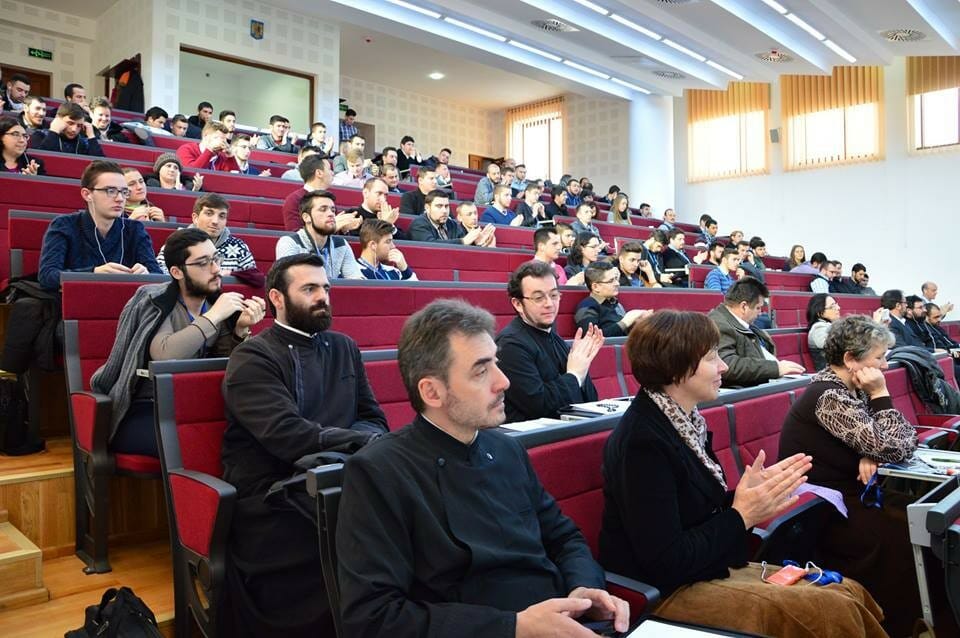
Dec 28, 2015 | Focolare Worldwide
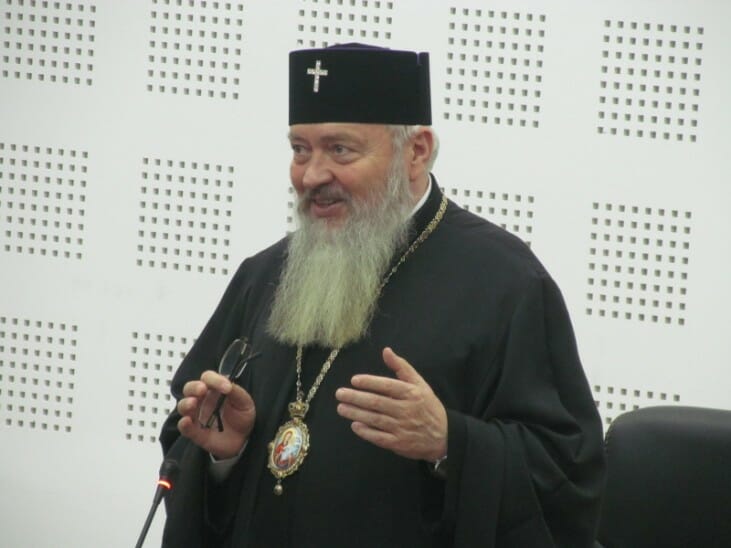 Already in 2004, getting to know each other, establishing dialogue and intensifying the spirit of communion were the objectives that had pushed the Orthodox Faculty of Theology of University Babeş – Bolyai of Cluj-Napoca and the members of the Focolare Movement to start a fruitful spiritual exchange of ideas and experiences. With time, this relationship was enriched by an ecumenical course that led to a dialogue at a theological level especially in recent years. In the common desire to bring Chiara Lubich’s charism of unity to Orthodox theology, this year both parties agreed to foster joint activities between the Romanian Faculty and the Sophia University Institute (SUI) in Loppiano (Florence), in a Symposium between the two academic institutions in Cluj-Napoca from 26 to 28 November. The symposium was opened by the Metropolitan of Cluj-Napoca, Andrei Andreicut who conveyed encouraging words for the precious effort to reach this deep communion. Also present was Bishop Vasile Somesanul, who has been a protagonist for many years in this undertaking. The lessons were entrusted to SUI professors on the part of the Movement, among whom was the Institute’s Rector, Piero Coda. On the Orthodox side, was the Dean of the Faculty, Fr Vasile Stanciu, with three qualified professors of three of the theological faculties in Romania, Cluj, Sibiu and Alba Iulia. Some lessons like those on ecumenism and the sacred scriptures were jointly expounded.
Already in 2004, getting to know each other, establishing dialogue and intensifying the spirit of communion were the objectives that had pushed the Orthodox Faculty of Theology of University Babeş – Bolyai of Cluj-Napoca and the members of the Focolare Movement to start a fruitful spiritual exchange of ideas and experiences. With time, this relationship was enriched by an ecumenical course that led to a dialogue at a theological level especially in recent years. In the common desire to bring Chiara Lubich’s charism of unity to Orthodox theology, this year both parties agreed to foster joint activities between the Romanian Faculty and the Sophia University Institute (SUI) in Loppiano (Florence), in a Symposium between the two academic institutions in Cluj-Napoca from 26 to 28 November. The symposium was opened by the Metropolitan of Cluj-Napoca, Andrei Andreicut who conveyed encouraging words for the precious effort to reach this deep communion. Also present was Bishop Vasile Somesanul, who has been a protagonist for many years in this undertaking. The lessons were entrusted to SUI professors on the part of the Movement, among whom was the Institute’s Rector, Piero Coda. On the Orthodox side, was the Dean of the Faculty, Fr Vasile Stanciu, with three qualified professors of three of the theological faculties in Romania, Cluj, Sibiu and Alba Iulia. Some lessons like those on ecumenism and the sacred scriptures were jointly expounded.  The various papers focused on the theme of the Holy Spirit, as expressed in the Symposium’s title: St Basil the Great’s theological writings on the Holy Spirit. The work of the Holy Spirit in the Church and in creation. All felt that “the presence of the Holy Spirit was tangible, and evidenced not only in the luminosity of the papers presented, but also in the communion with God that everyone experienced”. One of the participants said, “We all felt that an encounter was possible since there was the real intent to give of oneself,” while another participant underlined “the great harmony that reigned, and the joy of being able to share the wealth of our single churches”. In the days before the Symposium lessons were given by Piero Coda at the Orthodox Faculty of Theology especially students of the Faculty itself, and also those of the Roman-Catholic, Greek-Catholic and Evangelical faculties of the University. During the week in the town of Sibiu an event focused on the debate on the future of Europe, organised by the Ecumenical Centre of Sibiu, at which among the main speakers were Professor Piero Coda and the writer, Andrei Pleşu, an outstanding Romanian academic. The Symposium was also the occasion to plan future projects and in this regard intense collaboration was foreseen. The next academic year will see an exchange of professors between the Orthodox Faculty and SUI. Prospects are for a joint seminar in Sophia in the first half of 2017.
The various papers focused on the theme of the Holy Spirit, as expressed in the Symposium’s title: St Basil the Great’s theological writings on the Holy Spirit. The work of the Holy Spirit in the Church and in creation. All felt that “the presence of the Holy Spirit was tangible, and evidenced not only in the luminosity of the papers presented, but also in the communion with God that everyone experienced”. One of the participants said, “We all felt that an encounter was possible since there was the real intent to give of oneself,” while another participant underlined “the great harmony that reigned, and the joy of being able to share the wealth of our single churches”. In the days before the Symposium lessons were given by Piero Coda at the Orthodox Faculty of Theology especially students of the Faculty itself, and also those of the Roman-Catholic, Greek-Catholic and Evangelical faculties of the University. During the week in the town of Sibiu an event focused on the debate on the future of Europe, organised by the Ecumenical Centre of Sibiu, at which among the main speakers were Professor Piero Coda and the writer, Andrei Pleşu, an outstanding Romanian academic. The Symposium was also the occasion to plan future projects and in this regard intense collaboration was foreseen. The next academic year will see an exchange of professors between the Orthodox Faculty and SUI. Prospects are for a joint seminar in Sophia in the first half of 2017.
![Economy of Comunione in Guatemala: the Company Becomes a Family]()
Dec 26, 2015 | Focolare Worldwide
 Nine business owners have enrolled in an EoC course in the small Central American country of Guatemala, a land with a strong indigeneous ancestry and sharp social contrasts.They have been delving into the fundamentals of the project on a monthly basis and examining experiences that are currently underway in other parts of the world. “The basic text,” course director, Sandra Macario, explains, “is Il prezzo della gratuità (Bruni), but we often have Skype link-ups with other EoC business owners in Mexico City and other Latin American countries.” An Open Day was held on November 26th for people who might be interested in an End-of-the-Year Breakfast which is customary in this area of the world with its traditional beans and corn dishes. The breakfast was attended by forty people. Maria Luisa Altamirano from Mexico was the guest of honour, who presented her experience as a business owner and responded to questions from the audience. Besides course members, Brazilian business owner, Ismael Yos, who attended the same course in Brazil, also spoke. The testimony of Guatamalen architect, Jose Mario Contreras, was exceptionally moving. He does not always have steady work, so he depends on a pool of workers whom he can call when he needs them. They know that work is scarce and realise that when they are not working for him, they must find whatever work can be found. At times workers are urgently needed, such as the time they had to restructure and fit out a Dyalisis Centre. Due to a cancellation of a contract with another company and susequent suspension of service, it became even more pressing. They were in need of builders to restructure the building and engineers to operate machinery. Contreras presented his bid, and all voted in favour, except for the delivery time which was reduced by half or else forfiet the job. It was an impossible problem. The last card he had to play was dialoging with the workers. Dialogue was a concept that Contreras had been implementing for some time, and he had introduced it as one of the foundations of his work activity, a lifestyle that has proven to be efficacious at such critical times. His proposal to the workers of working double shifts was unanimously accepted, not only because they did not want to lose out on the job, but because they trusted him and one another. Contrary to all technical predictions the job was finished on time, and the patients who were waiting recieved treatment on the date that had previously been agreed on. On another occasion Contreras had received a telephone call from one of his employees. It was early in the morning, too early to disturb the boss. But it was serious: his small daughter was ill and in urgent need of a certain medication that was too costly for the employee. Contreras listened to him like a brother: “For now I’ll begin to pray for your daughter,” he told him. “As soon as the bank opens, I’ll send you the money you need.” Contreras had the feeling that his company “had become a family.”
Nine business owners have enrolled in an EoC course in the small Central American country of Guatemala, a land with a strong indigeneous ancestry and sharp social contrasts.They have been delving into the fundamentals of the project on a monthly basis and examining experiences that are currently underway in other parts of the world. “The basic text,” course director, Sandra Macario, explains, “is Il prezzo della gratuità (Bruni), but we often have Skype link-ups with other EoC business owners in Mexico City and other Latin American countries.” An Open Day was held on November 26th for people who might be interested in an End-of-the-Year Breakfast which is customary in this area of the world with its traditional beans and corn dishes. The breakfast was attended by forty people. Maria Luisa Altamirano from Mexico was the guest of honour, who presented her experience as a business owner and responded to questions from the audience. Besides course members, Brazilian business owner, Ismael Yos, who attended the same course in Brazil, also spoke. The testimony of Guatamalen architect, Jose Mario Contreras, was exceptionally moving. He does not always have steady work, so he depends on a pool of workers whom he can call when he needs them. They know that work is scarce and realise that when they are not working for him, they must find whatever work can be found. At times workers are urgently needed, such as the time they had to restructure and fit out a Dyalisis Centre. Due to a cancellation of a contract with another company and susequent suspension of service, it became even more pressing. They were in need of builders to restructure the building and engineers to operate machinery. Contreras presented his bid, and all voted in favour, except for the delivery time which was reduced by half or else forfiet the job. It was an impossible problem. The last card he had to play was dialoging with the workers. Dialogue was a concept that Contreras had been implementing for some time, and he had introduced it as one of the foundations of his work activity, a lifestyle that has proven to be efficacious at such critical times. His proposal to the workers of working double shifts was unanimously accepted, not only because they did not want to lose out on the job, but because they trusted him and one another. Contrary to all technical predictions the job was finished on time, and the patients who were waiting recieved treatment on the date that had previously been agreed on. On another occasion Contreras had received a telephone call from one of his employees. It was early in the morning, too early to disturb the boss. But it was serious: his small daughter was ill and in urgent need of a certain medication that was too costly for the employee. Contreras listened to him like a brother: “For now I’ll begin to pray for your daughter,” he told him. “As soon as the bank opens, I’ll send you the money you need.” Contreras had the feeling that his company “had become a family.”
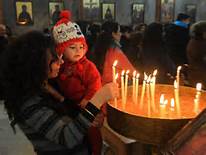
Dec 21, 2015 | Focolare Worldwide
 “The life of each day varies, because the danger varies. On some days nothing happens, and you could even forget that there was a war. On other days you could be on your way to work and get hit by stray bullets, or walk into a battle, or under falling bombs in the middle of a civilian area,” Pascal reports. He has been living in a focolare in Syria for several years. How are we preparing for Christmas? In Aleppo, Kafarbou and Damascus our communities are focusing mostly on the children, because in spite of the fact that it’s such a celebrated feast in Syria, families are finding it hard to experience the joy of Christmas. Therefore, the young people have done a lot of projects to raise funds which, joined to the donations that have come in from outside, has allowed them to expand their project of giving back the meaning of Christmas to the children and their families. In Aleppo, for example, there will be a feast for around 70 families; in Kafarbou they will visit houses in small groups, with food and gifts. In Damascus, where there are more possibilities, they’ve organised a Christmas concert and, in the meantime, will visit families with food, gifts, songs and games. . .” And in recent months with the escalation of violence, have you focolarini ever reconsidered your decision to stay in Syria? “No, never. The focolare’s presence is so important! There mere presence even without doing anything. It’s a sign that the Movement around the world is with them, with the Syrian people. I don’t know how to explain it. . . We’re not obliged to stay; we can leave. We’ve shared so many hardships with them over these years that they feel like we belong to the them, and we feel that they belong to us. Our reasons aren’t rational but affective, a matter of the heart. There’s no rational reason for staying in Aleppo. The Syrian families that stay do it because of their connection to the land, to their people, because everything else says: get out! Here, everything is disappearing, day by day there is less and less of a future for your children. I saw some remain out of a choice of love, to give witness. For example, some remained so that a school for deaf children could continue. Living for others gives you the meaning to life, it gives meaning to your existence.”
“The life of each day varies, because the danger varies. On some days nothing happens, and you could even forget that there was a war. On other days you could be on your way to work and get hit by stray bullets, or walk into a battle, or under falling bombs in the middle of a civilian area,” Pascal reports. He has been living in a focolare in Syria for several years. How are we preparing for Christmas? In Aleppo, Kafarbou and Damascus our communities are focusing mostly on the children, because in spite of the fact that it’s such a celebrated feast in Syria, families are finding it hard to experience the joy of Christmas. Therefore, the young people have done a lot of projects to raise funds which, joined to the donations that have come in from outside, has allowed them to expand their project of giving back the meaning of Christmas to the children and their families. In Aleppo, for example, there will be a feast for around 70 families; in Kafarbou they will visit houses in small groups, with food and gifts. In Damascus, where there are more possibilities, they’ve organised a Christmas concert and, in the meantime, will visit families with food, gifts, songs and games. . .” And in recent months with the escalation of violence, have you focolarini ever reconsidered your decision to stay in Syria? “No, never. The focolare’s presence is so important! There mere presence even without doing anything. It’s a sign that the Movement around the world is with them, with the Syrian people. I don’t know how to explain it. . . We’re not obliged to stay; we can leave. We’ve shared so many hardships with them over these years that they feel like we belong to the them, and we feel that they belong to us. Our reasons aren’t rational but affective, a matter of the heart. There’s no rational reason for staying in Aleppo. The Syrian families that stay do it because of their connection to the land, to their people, because everything else says: get out! Here, everything is disappearing, day by day there is less and less of a future for your children. I saw some remain out of a choice of love, to give witness. For example, some remained so that a school for deaf children could continue. Living for others gives you the meaning to life, it gives meaning to your existence.”
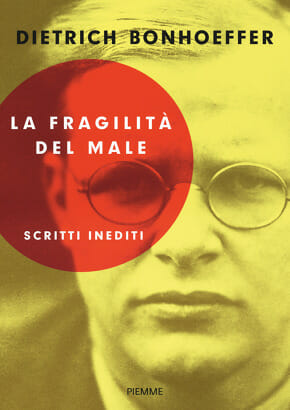
Dec 20, 2015 | Focolare Worldwide
 Bonhoeffer was among the first to criticise the Third Reich and was in the United States when the Second World War broke out. He returned to his homeland to suffer with his people. Conscious of the risk, he faced it in a spirit of freedom and with a strong sense of justice. A theologian and Lutheran pastor, he died at a concentration camp in Flossenbürg on April 9, 1945 after being condemned for his opposition to the Nazi regime. We remember him with some of his thoughts on mercy published in “La fragilità del male, raccolta di scritti inediti”. “Each day the Christian community sings: ‘I have received mercy.’ I have obtained this gift even when I closed my heart to God: when I took up the path of sin; when I loved my faults more than God; when I encountered misery and suffering in exchange for what I had done; when I was lost and was not able to find the path of return. Therefore, it was the word of the Lord that came out to meet me. Therefore, I understood: He loves me. Jesus has found me: he was near to me, only Him. He gave me comfort, forgave all my errors and did not find me guilty of evil. When I was his enemy and did not respect his commandments, he treated me like a friend. When I did him wrong, he returned to me only goodness. He did not condemn me for my misdeeds, but unceasingly sought me out and without rancour. He suffered for me and died for me. He put up with everything for me. He won me. The Father had found his son again. We think of all these things when we intone that song. I can hardly fathom why the Lord loves me in this way, why I am so dear to him. I cannot understand how he managed to and wanted to win my heart with his love, all I can say is: ‘I have received mercy.” Dietrich Bonhoeffer, La fragilità del male, raccolta di scritti inediti (Piemme, 2015)
Bonhoeffer was among the first to criticise the Third Reich and was in the United States when the Second World War broke out. He returned to his homeland to suffer with his people. Conscious of the risk, he faced it in a spirit of freedom and with a strong sense of justice. A theologian and Lutheran pastor, he died at a concentration camp in Flossenbürg on April 9, 1945 after being condemned for his opposition to the Nazi regime. We remember him with some of his thoughts on mercy published in “La fragilità del male, raccolta di scritti inediti”. “Each day the Christian community sings: ‘I have received mercy.’ I have obtained this gift even when I closed my heart to God: when I took up the path of sin; when I loved my faults more than God; when I encountered misery and suffering in exchange for what I had done; when I was lost and was not able to find the path of return. Therefore, it was the word of the Lord that came out to meet me. Therefore, I understood: He loves me. Jesus has found me: he was near to me, only Him. He gave me comfort, forgave all my errors and did not find me guilty of evil. When I was his enemy and did not respect his commandments, he treated me like a friend. When I did him wrong, he returned to me only goodness. He did not condemn me for my misdeeds, but unceasingly sought me out and without rancour. He suffered for me and died for me. He put up with everything for me. He won me. The Father had found his son again. We think of all these things when we intone that song. I can hardly fathom why the Lord loves me in this way, why I am so dear to him. I cannot understand how he managed to and wanted to win my heart with his love, all I can say is: ‘I have received mercy.” Dietrich Bonhoeffer, La fragilità del male, raccolta di scritti inediti (Piemme, 2015)
Dec 18, 2015 | Focolare Worldwide
The 11th edition of the School of Inculturation will be held in Kenya at the Mariapolis Piero, from 17 to 23 May 2016. Maria Voce and Jesús Morán will also attend. In May 2016 the “Mariapolis Piero” in Kenya, close to Nairobi – will host the 11th edition of the School of Inculturation, a reality which Chiara Lubich prophetically foresaw. The 250 or more delegates from Sub-Saharian Africa will focus on the theme, “The African Family,” and will reflect on the relationships of “man-woman” in their roles and responsibilities in family life, and the challenge of educating towards values. It will be held as part of the Pan-African meeting of the continent’s New Families. The national commission will present the speeches and dissertations that will trace the roots of the cultures, to be demonstrated through the concrete experiences of men and women who have embraced the charism of unity. There are great expectations and a particular joy in knowing that Maria Voce and Jesús Morán, President and Co-President, respectively, will attend together with some central councilors. Further details to be announced.
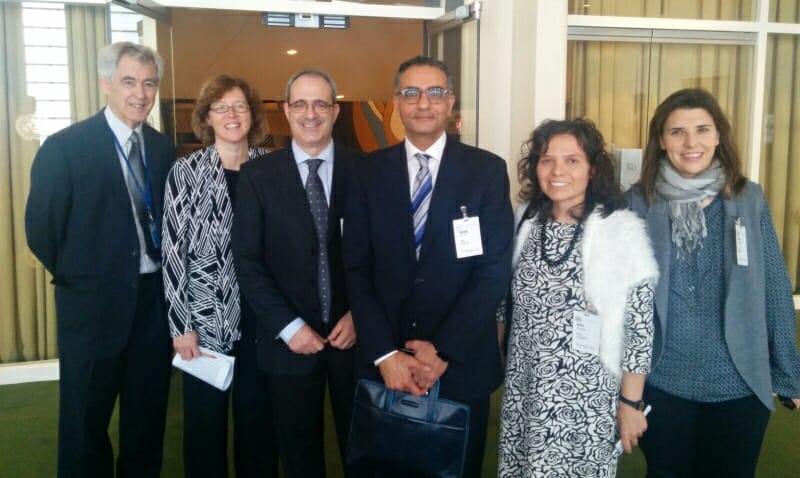
Dec 18, 2015 | Focolare Worldwide
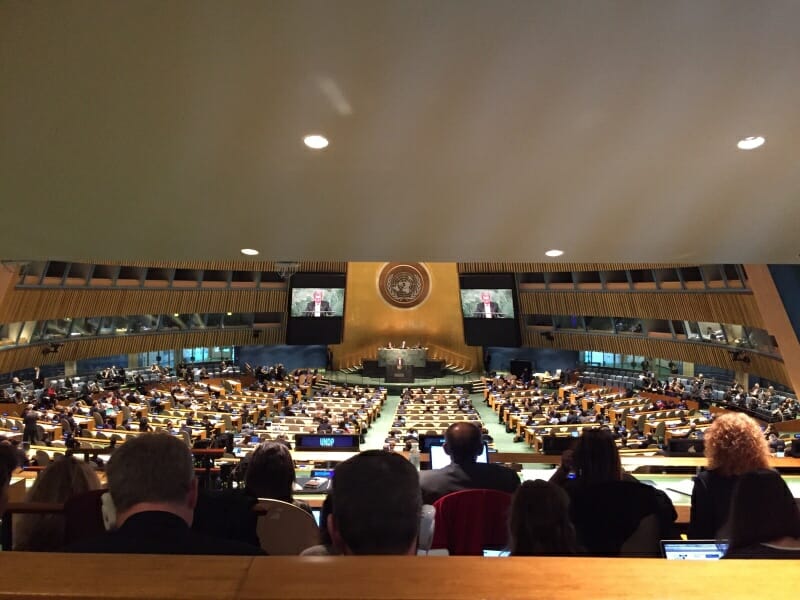
A working session during the conference

With Mr Fadi Chehade, President of ICANN (centre), a non profit organisation which administers the assignation of top level domains on the Internet.

 Already in 2004, getting to know each other, establishing dialogue and intensifying the spirit of communion were the objectives that had pushed the Orthodox Faculty of Theology of University Babeş – Bolyai of Cluj-Napoca and the members of the Focolare Movement to start a fruitful spiritual exchange of ideas and experiences. With time, this relationship was enriched by an ecumenical course that led to a dialogue at a theological level especially in recent years. In the common desire to bring Chiara Lubich’s charism of unity to Orthodox theology, this year both parties agreed to foster joint activities between the Romanian Faculty and the Sophia University Institute (SUI) in Loppiano (Florence), in a Symposium between the two academic institutions in Cluj-Napoca from 26 to 28 November. The symposium was opened by the Metropolitan of Cluj-Napoca, Andrei Andreicut who conveyed encouraging words for the precious effort to reach this deep communion. Also present was Bishop Vasile Somesanul, who has been a protagonist for many years in this undertaking. The lessons were entrusted to SUI professors on the part of the Movement, among whom was the Institute’s Rector, Piero Coda. On the Orthodox side, was the Dean of the Faculty, Fr Vasile Stanciu, with three qualified professors of three of the theological faculties in Romania, Cluj, Sibiu and Alba Iulia. Some lessons like those on ecumenism and the sacred scriptures were jointly expounded.
Already in 2004, getting to know each other, establishing dialogue and intensifying the spirit of communion were the objectives that had pushed the Orthodox Faculty of Theology of University Babeş – Bolyai of Cluj-Napoca and the members of the Focolare Movement to start a fruitful spiritual exchange of ideas and experiences. With time, this relationship was enriched by an ecumenical course that led to a dialogue at a theological level especially in recent years. In the common desire to bring Chiara Lubich’s charism of unity to Orthodox theology, this year both parties agreed to foster joint activities between the Romanian Faculty and the Sophia University Institute (SUI) in Loppiano (Florence), in a Symposium between the two academic institutions in Cluj-Napoca from 26 to 28 November. The symposium was opened by the Metropolitan of Cluj-Napoca, Andrei Andreicut who conveyed encouraging words for the precious effort to reach this deep communion. Also present was Bishop Vasile Somesanul, who has been a protagonist for many years in this undertaking. The lessons were entrusted to SUI professors on the part of the Movement, among whom was the Institute’s Rector, Piero Coda. On the Orthodox side, was the Dean of the Faculty, Fr Vasile Stanciu, with three qualified professors of three of the theological faculties in Romania, Cluj, Sibiu and Alba Iulia. Some lessons like those on ecumenism and the sacred scriptures were jointly expounded.  The various papers focused on the theme of the Holy Spirit, as expressed in the Symposium’s title: St Basil the Great’s theological writings on the Holy Spirit. The work of the Holy Spirit in the Church and in creation. All felt that “the presence of the Holy Spirit was tangible, and evidenced not only in the luminosity of the papers presented, but also in the communion with God that everyone experienced”. One of the participants said, “We all felt that an encounter was possible since there was the real intent to give of oneself,” while another participant underlined “the great harmony that reigned, and the joy of being able to share the wealth of our single churches”. In the days before the Symposium lessons were given by Piero Coda at the Orthodox Faculty of Theology especially students of the Faculty itself, and also those of the Roman-Catholic, Greek-Catholic and Evangelical faculties of the University. During the week in the town of Sibiu an event focused on the debate on the future of Europe, organised by the Ecumenical Centre of Sibiu, at which among the main speakers were Professor Piero Coda and the writer, Andrei Pleşu, an outstanding Romanian academic. The Symposium was also the occasion to plan future projects and in this regard intense collaboration was foreseen. The next academic year will see an exchange of professors between the Orthodox Faculty and SUI. Prospects are for a joint seminar in Sophia in the first half of 2017.
The various papers focused on the theme of the Holy Spirit, as expressed in the Symposium’s title: St Basil the Great’s theological writings on the Holy Spirit. The work of the Holy Spirit in the Church and in creation. All felt that “the presence of the Holy Spirit was tangible, and evidenced not only in the luminosity of the papers presented, but also in the communion with God that everyone experienced”. One of the participants said, “We all felt that an encounter was possible since there was the real intent to give of oneself,” while another participant underlined “the great harmony that reigned, and the joy of being able to share the wealth of our single churches”. In the days before the Symposium lessons were given by Piero Coda at the Orthodox Faculty of Theology especially students of the Faculty itself, and also those of the Roman-Catholic, Greek-Catholic and Evangelical faculties of the University. During the week in the town of Sibiu an event focused on the debate on the future of Europe, organised by the Ecumenical Centre of Sibiu, at which among the main speakers were Professor Piero Coda and the writer, Andrei Pleşu, an outstanding Romanian academic. The Symposium was also the occasion to plan future projects and in this regard intense collaboration was foreseen. The next academic year will see an exchange of professors between the Orthodox Faculty and SUI. Prospects are for a joint seminar in Sophia in the first half of 2017.
 Nine business owners have enrolled in an EoC course in the small Central American country of Guatemala, a land with a strong indigeneous ancestry and sharp social contrasts.They have been delving into the fundamentals of the project on a monthly basis and examining experiences that are currently underway in other parts of the world. “The basic text,” course director, Sandra Macario, explains, “is Il prezzo della gratuità (Bruni), but we often have Skype link-ups with other EoC business owners in Mexico City and other Latin American countries.” An Open Day was held on November 26th for people who might be interested in an End-of-the-Year Breakfast which is customary in this area of the world with its traditional beans and corn dishes. The breakfast was attended by forty people. Maria Luisa Altamirano from Mexico was the guest of honour, who presented her experience as a business owner and responded to questions from the audience. Besides course members, Brazilian business owner, Ismael Yos, who attended the same course in Brazil, also spoke. The testimony of Guatamalen architect, Jose Mario Contreras, was exceptionally moving. He does not always have steady work, so he depends on a pool of workers whom he can call when he needs them. They know that work is scarce and realise that when they are not working for him, they must find whatever work can be found. At times workers are urgently needed, such as the time they had to restructure and fit out a Dyalisis Centre. Due to a cancellation of a contract with another company and susequent suspension of service, it became even more pressing. They were in need of builders to restructure the building and engineers to operate machinery. Contreras presented his bid, and all voted in favour, except for the delivery time which was reduced by half or else forfiet the job. It was an impossible problem. The last card he had to play was dialoging with the workers. Dialogue was a concept that Contreras had been implementing for some time, and he had introduced it as one of the foundations of his work activity, a lifestyle that has proven to be efficacious at such critical times. His proposal to the workers of working double shifts was unanimously accepted, not only because they did not want to lose out on the job, but because they trusted him and one another. Contrary to all technical predictions the job was finished on time, and the patients who were waiting recieved treatment on the date that had previously been agreed on. On another occasion Contreras had received a telephone call from one of his employees. It was early in the morning, too early to disturb the boss. But it was serious: his small daughter was ill and in urgent need of a certain medication that was too costly for the employee. Contreras listened to him like a brother: “For now I’ll begin to pray for your daughter,” he told him. “As soon as the bank opens, I’ll send you the money you need.” Contreras had the feeling that his company “had become a family.”
Nine business owners have enrolled in an EoC course in the small Central American country of Guatemala, a land with a strong indigeneous ancestry and sharp social contrasts.They have been delving into the fundamentals of the project on a monthly basis and examining experiences that are currently underway in other parts of the world. “The basic text,” course director, Sandra Macario, explains, “is Il prezzo della gratuità (Bruni), but we often have Skype link-ups with other EoC business owners in Mexico City and other Latin American countries.” An Open Day was held on November 26th for people who might be interested in an End-of-the-Year Breakfast which is customary in this area of the world with its traditional beans and corn dishes. The breakfast was attended by forty people. Maria Luisa Altamirano from Mexico was the guest of honour, who presented her experience as a business owner and responded to questions from the audience. Besides course members, Brazilian business owner, Ismael Yos, who attended the same course in Brazil, also spoke. The testimony of Guatamalen architect, Jose Mario Contreras, was exceptionally moving. He does not always have steady work, so he depends on a pool of workers whom he can call when he needs them. They know that work is scarce and realise that when they are not working for him, they must find whatever work can be found. At times workers are urgently needed, such as the time they had to restructure and fit out a Dyalisis Centre. Due to a cancellation of a contract with another company and susequent suspension of service, it became even more pressing. They were in need of builders to restructure the building and engineers to operate machinery. Contreras presented his bid, and all voted in favour, except for the delivery time which was reduced by half or else forfiet the job. It was an impossible problem. The last card he had to play was dialoging with the workers. Dialogue was a concept that Contreras had been implementing for some time, and he had introduced it as one of the foundations of his work activity, a lifestyle that has proven to be efficacious at such critical times. His proposal to the workers of working double shifts was unanimously accepted, not only because they did not want to lose out on the job, but because they trusted him and one another. Contrary to all technical predictions the job was finished on time, and the patients who were waiting recieved treatment on the date that had previously been agreed on. On another occasion Contreras had received a telephone call from one of his employees. It was early in the morning, too early to disturb the boss. But it was serious: his small daughter was ill and in urgent need of a certain medication that was too costly for the employee. Contreras listened to him like a brother: “For now I’ll begin to pray for your daughter,” he told him. “As soon as the bank opens, I’ll send you the money you need.” Contreras had the feeling that his company “had become a family.” 


